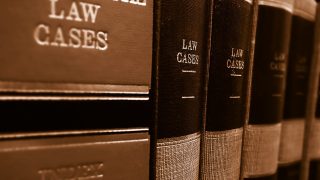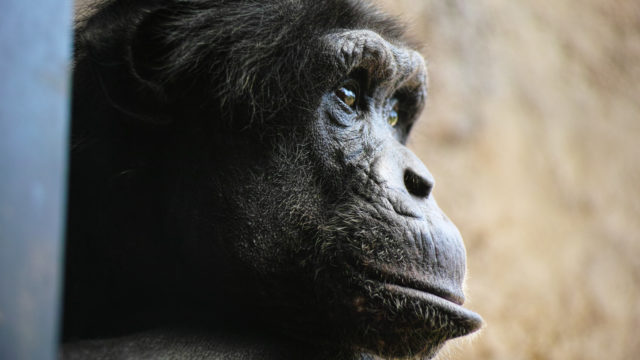
Administrative law– Government agencies are often tasked with interpreting and implementing the laws passed by legislatures and other lawmaking bodies. The body of law relating to these agencies is called administrative law. This includes regulations that agencies create and execute. The federal Administrative Procedure Act governs much of how federal government agencies can enact and effect regulations, and other aspects of how the agencies operate. This law is an important tool in holding agencies accountable.
The Animal Legal Defense Fund has repeatedly sued government agencies over violations of the Administrative Procedure Act. For example, when the United States Department of Agriculture removed tens of thousands of animal welfare records from the agency’s website in 2017, we sued them for—among other things—violating the Administrative Procedure Act.
Amicus curiae– “Amicus curiae” is Latin for “friend of the court.” Sometimes parties not directly involved in a lawsuit will want to share expertise and opinion on the matter at hand with the court, usually through asking permission to file what’s known as an “amicus curiae brief” or an “amicus brief.” The briefs are important tools for advocates.
The Animal Legal Defense Fund often requests permission to submit an amicus curiae brief in cases involving animals, especially when those cases involve important or novel issues. As the preeminent legal advocacy organization for animals, our expertise is valuable in these cases. For example, we filed an amicus brief with the Ninth Circuit Court of Appeals in California in Ass’n des Eleveurs de Canards et d’Oies du Quebec v. Becerra, a case in which duck farmers challenged California’s law banning the sale of foie gras. This law had been under constant attack since going into effect in 2012. The Animal Legal Defense Fund filed an amicus brief with the court urging it to uphold the law—which the court did, in 2017.
Animal Welfare Act– The Animal Welfare Act (AWA)— is the primary federal animal protection law. The AWA, which was signed into law in 1966, mainly involves animals kept at zoos and used in laboratories, as well as animals who are commercially bred and sold like those in puppy mills. The AWA directs the Secretary of the United States Department of Agriculture to set minimum standards regarding animals’ “handling, care, treatment, and transportation.” Dog fighting and cockfighting are also prohibited under the Animal Welfare Act, so long as the activity in some way crosses state lines.
The AWA itself, as well as its enforcement by the Department of Agriculture, are frequently criticized as allowing inhumane practices to go unchecked. Additionally, the AWA does not apply to roughly 95 percent of the animals tested upon in labs—such as rats, mice, birds, fish, and reptile—and provides only minimal protections for the rest. Labs are not required to report non-AWA protected animals.
Appeal-A party to a lawsuit may “appeal” the judge or jury’s decision to a higher court, known generally as a court of appeals. This means asking the appellate court to find that the lower court made an error of law or procedure warranting the lower court’s decision to be reversed, and/or for the case to be “remanded” to the lower court for new proceedings.
Courts of appeals will examine the record of the lower court but do not hold new trials with witnesses and new evidence. If your case is in federal court, you will appeal from the federal district court which heard your case to whichever of the 13 federal court of appeals has jurisdiction over your case. In the federal system, the only appellate court above the court of appeals, is the U.S. Supreme Court. If your case is in state court, you will appeal to your state’s court of appeals. In most states there is then another appellate court above that one, usually called the state supreme court—more colloquially known as the “court of last resort.” By and large, state supreme courts have “discretionary review,” meaning that they can take the case but are not obligated to do so.
Appellate-Appellate courts are those courts that review lower courts’ decisions and actions. More broadly, the term “appellate” refers to anything relating to appeals. So for example, an appellate judge is a judge who hears appeals; an appellate brief is a brief filed in an appeal.
Civil law-There are two types of law: civil law and criminal law. While criminal law deals with the laws about crimes and punishments, civil law broadly refers to the body of law outside the scope of criminal law. This is an expansive category that includes everything from contract law, personal injury lawsuits, family law, and more, and may include as lawsuits against government officials and agencies.
Animal cruelty prosecutions are examples of criminal animal law, but much of animal law involves civil law — as do many of the lawsuits and other actions that the Animal Legal Defense Fund is involved with. For example, when we sue roadside zoos for mistreatment of animals under the Endangered Species Act, this is a civil law action. Our lawsuits against government agencies for failing to respond to open-records requests are also civil law actions.
Class action-Class action lawsuits involve groups of plaintiffs who have suffered similar harm at the hands of a defendant, and who bring a lawsuit together against that defendant. Generally, class action lawsuits will have one or several named plaintiffs, who litigate the case on behalf of the group—the class—as a whole.
The Animal Legal Defense Fund has filed class action lawsuits in some animal-related cases. For example in 2017 we brought a class action lawsuit against Petland, a national pet store chain, and the chain’s Kennesaw, Georgia location, for duping customers into buying sick, puppy mill bred puppies. The class in this case consists of consumers across the country who’d bought puppies from Petland having been promised they were healthy, and found they were instead very sick.
Criminal law-Laws and procedures dealing with what constitutes a crime, and the punishment of those who commit crimes.
The Animal Legal Defense Fund is involved with the field of criminal law affecting animals on a number of fronts. Our Criminal Justice Program is staffed by attorneys, including former prosecutors, with expertise in animal protection law. Our attorneys provide free legal assistance to prosecutors and law enforcement agencies to ensure that state criminal anti-cruelty statutes are vigorously enforced and that those convicted of animal cruelty and neglect receive appropriate sentences. We work with state legislators to enact felony anti-cruelty statutes in states that do not yet have them and to upgrade existing laws in states that do. The Criminal Justice Program also maintains a nationwide database of animal cruelty cases and current and model animal protection laws available to prosecutors, legislators and researchers.
Endangered Species Act– The Endangered Species Act, also called the ESA, is one of the key federal laws we use to secure stronger legal protection for animals. Enacted in 1973, the Endangered Species Act protects fish, mammals and birds – as well as plants – listed as threatened or endangered in the United States and beyond. The ESA outlines procedures for federal agencies to follow regarding listed species, as well as criminal and civil penalties for violations. The ESA does not address living conditions of captive animals. This law is chiefly enforced by the U.S. Fish and Wildlife Service and the U.S. National Oceanic and Atmospheric Administration Fisheries Service.
The Animal Legal Defense Fund successfully brought a lawsuit under the Endangered Species Act against a roadside zoo called the Cricket Hollow Animal Park, that was mistreating protected animals. This was the first time that the ESA has successfully been used to protect captive wild animals. In 2018, the Eighth Circuit issued a unanimous decision in that it can be a violation of the Endangered Species Act, when captive animals aren’t given proper care.
Felony-A category of crime more serious than misdemeanors or infractions. Felonies comes with more severe penalties than misdemeanors, such as longer jail terms. The general rule is that crimes which carry punishments of at least one year in prison are considered to be felonies. Each state has its own criminal code; behavior that could constitute a felony in one state may be considered more or less serious in another.
The Animal Legal Defense Fund has long advocated for state legislatures to pass laws making crimes against animals a felony. As of 2014, all 50 states have felony animal cruelty statues on the books.
Guardian Ad Litem-Ad Litem is Latin for “for the lawsuit.” A guardian ad litem is someone appointed to represent the best interests of a person who cannot do so for themselves, usually a child.
In 2017, Connecticut became the first state to create a guardian ad litem program for animals, which allows legal advocates to testify on behalf of animal victims in cruelty and neglect cases.
Injunction-An injunction is a court order that requires a person or other party to do something or not to do something. A temporary injunction may be issued before the court has reached its final decision in the case at hand, if the party asking for the injunction can meet the standard of proving “a likelihood of success on the merits.” When the case is complete, a judge may order a permanent injunction.
The Animal Legal Defense Fund might ask a court to issue an injunction in many different types of legal actions. For example, in 1985, in a first-of-its-kind legal action, we filed a lawsuit in New York asking for a statewide permanent injunction against the use of steel-jaw leghold traps on the grounds that the trap violates state anti-cruelty laws. In 2018, we filed a motion for a preliminary injunction asking a federal court to take immediate steps to stop the Army’s illegal roundup and sale of Louisiana’s wild horses pending their lawsuit’s resolution.
Intervene/intervention– An intervention, or a motion to intervene, is a way for a new party to join a lawsuit when they are affected by the issues at stake in the case.
The Animal Legal Defense Fund intervened in SeaWorld’s lawsuit against the California Coastal Commission because SeaWorld was challenging conditions the commission placed on SeaWorld’s permits to expand—conditions we originally proposed to the commission.
Intrinsic Value-The true value of something, taking into consideration tangible and intangible factors, as opposed to the thing’s “market value” or value under some other economic measure. Courts are beginning to recognize that animals—technically considered “property” under the law—have an intrinsic value to their families beyond their market value, which is often zero dollars.
Misdemeanor-A category of crime less severe than a felony. Misdemeanors are likely to be punished with fines and periods of imprisonment less than a year. Each state has its own criminal code; behavior that could constitute a misdemeanor in one state may be considered more or less serious in another.
National Environmental Policy Act— The National Environmental Policy Act, or NEPA, is a federal environmental protection law that was enacted in 1970. NEPA requires government agencies to consider the environmental effects of any proposed actions.
The Animal Legal Defense Fund brings actions under NEPA. For example, in 2017, we sued the U.S. Department of Agriculture’s Wildlife Services for failing to comply with the National Environmental Policy Act in accounting for the harm the agency causes to native Californian wildlife, including coyotes, foxes, and bobcats. That same year we also petitioned two federal agencies to carefully review the environmental, animal-welfare and public-health impacts of a number of rapidly expanding animal agriculture operations in an ecologically pristine area of northeastern Arkansas, arguing that NEPA requires the federal government to consider the welfare of the chickens themselves.
Oral argument–Oral arguments are court proceedings in which attorneys have the opportunity to present their case orally before a judge or a panel of judges. The term generally refers to proceedings taking place in state or federal appellate courts. Generally, the lawyers will have a set amount of time in which to present their arguments, and may also be asked questions by the judges.
Precedent-In the American legal system, law is established in two ways: by the legislative branch, and by the judiciary through legal decisions. “Precedent” refers to previous court decisions that either guide or bind future courts considering cases with similar facts.
The field of animal law is still very new, which leaves a lot of room to bring new and important precedent-setting cases. The Animal Legal Defense Fund pursues many of these cases. That means we file lawsuits in cases involving novel issues of law, with the aim of securing judicial rulings that will help establish important precedents which will go on to help animals beyond those at issue in the case at hand.
An example of this is our lawsuit against the Cricket Hollow Animal Park, a roadside zoo in Manchester, Iowa. We sued Cricket Hollow in 2014 and 2016, alleging a brand new cause of action: that the zoo’s mistreatment of animals constituted a violation of the Endangered Species Act (the ESA). We won a positive ruling from the federal district court in 2016, and in 2018, a three-judge panel of the Eighth Circuit issued a unanimous decision upholding the district court’s ruling that Cricket Hollow Animal Park did violate the ESA. It was the first time this law had been used to protect captive, as opposed to wild, animals—and set important precedent, that would be used to protect other captive animals.
Probable Cause-Under the 4th Amendment of the U.S. Constitution, law enforcement officers are required to have “probable cause” in order to execute a search warrant or make an arrest. What constitutes probable cause in any given case can depend on a great number of factors. As the U.S. Supreme Court put it in Maryland v. Pringle, “The probable-cause standard is incapable of precise definition or quantification into percentages because it deals with probabilities and depends on the totality of the circumstances. We have stated, however, that the substance of all the definitions of probable cause is a reasonable ground for belief of guilt, and that the belief of guilt must be particularized with respect to the person to be searched or seized.”
Prosecutor-A prosecutor is an attorney who works for the government—local, state, or federal — and who is responsible for leading a case against a party charged with a crime. The prosecutor is also the attorney who decides which charges to file and whether to file a case at all. Many head prosecutors are elected to the position.
Remand– A case is “remanded” when an appellate court sends the case back down to a lower court for further proceedings. When a case is remanded, generally the appellate court will have reversed all or part of the lower court’s decision—the case will be remanded to the lower court with instructions as to how the lower court should proceed in light of the reversal.
Standing-In order to bring a lawsuit, the plaintiff must have “standing.” Legal standing is the requirement that the party filing a lawsuit has been, or will be, harmed by the defendant — and that the court can remedy this harm.
Animals’ status as “things,” or property, and their corresponding lack of fundamental legal rights, are persistent barriers to protecting their lives and advancing their interests through the legal system.
One of the areas in which animals’ lack of rights is most pronounced is when it comes to standing.
Criminal animal cruelty laws can usually be enforced only by prosecutors, not private citizens. So standing is a serious obstacle for animal advocates, as well.
Voir Dire-The process of selecting jurors. Potential jurors—usually pulled from lists kept by stage agencies, of registered voters or licensed drivers—will be called into the courtroom’s witness box. Attorneys for both sides will then have the chance for “voir dire,” which means asking each juror questions to determine if they could make an impartial decision in your case.
Some potential jurors will be eliminated during voir dire. This process will end once the plaintiff’s and defendant’s attorneys are satisfied that they have empaneled an impartial jury, plus some alternate jurors.
Related
-
OCTOPUS Act Reintroduced in the U.S. Senate
The federal bill would prevent the industry from gaining traction by banning commercial octopus farming in the U.S.June 5, 2025 Press Release -
Washington Governor Signs Animal Protection Bills into Law
The four laws will offer better protections for companion animals and keep wild animals from being exploited for entertainment in the stateMay 16, 2025 News -
Captive Primate Safety Act Reintroduced in the U.S. House to Protect Nonhuman Primates
Bill will prohibit the type of private possession of nonhuman primates portrayed in the HBO Max docuseries “Chimp Crazy”May 6, 2025 Press Release



